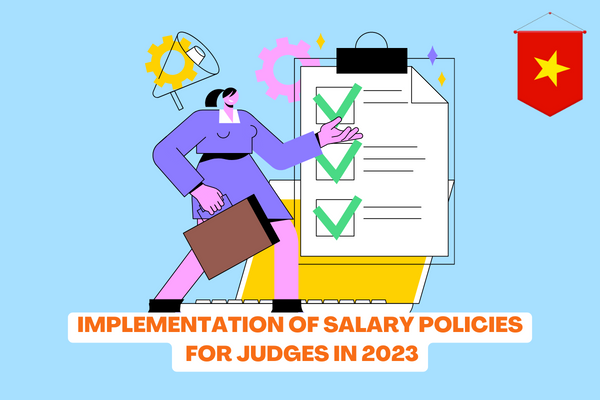Judge salaries in Vietnam: Will the salary system be added exclusively for judges in the future?
Will there be provisions for the Judge salary system in Vietnam?
Recently, in the Draft Proposal for the development of the Law on Organization of People's Courts (here), there have been contents related to the orientation of amending and supplementing regulations on the salary regime of judges.
Specifically, this draft submission sets out the view that it is necessary to reform the salary regime and remuneration policies to attract high-quality human resources.
Accordingly, this Draft also proposes solutions to amend and supplement regulations on salary regimes and remuneration policies for Judges in the direction of determining separate salary scales and tables for each rank and level of Judges.

Judge salaries in Vietnam: Will the salary system be added exclusively for judges in the future?
Will there be salary reforms for Judges in 2023 in Vietnam?
In Resolution 27-NQ/TW in 2018, the roadmap for salary reform for cadres, civil servants and public employees has been defined. However, pursuant to Clause 1 Article 3 of Resolution 69/2022/QH15 with the following content:
Article 3. Regarding implementation of salary policies
1. General reform of salary policies according to Resolution No. 27-NQ/TW dated May 21, 2018 of the 7th Meeting of the 12th Central Executive Committee is not yet implemented in 2023. From July 1, 2023, raise statutory pay rate of officials, public officials, and public employees to 1,8 million VND/month; increase pension and social insurance allowance by 12,5% for beneficiaries of state budget allowance and provide additional support for persons retiring before 1995 with low benefit level; increase standard allowance level for persons with meritorious services no lower than the poor household standard in Vietnam in urban areas and increase expenditure on social security policies associated with statutory pay rate by 20,8%. From January 1, 2023, raise professional allowance of preventive and center-based healthcare workers according to Conclusion No. 25-KL/TW dated December 30, 2021 of the Politburo.
…
Accordingly, the National Assembly clearly stated that the overall reform of wage policy under Resolution 27-NQ/TW has not been implemented in 2023.
In addition, the proposal to supplement regulations on the salary system for judges has only recently been presented by the Supreme People's Court in the draft proposal for the development of the Law on Organization of People's Courts. It is expected to submit to the National Assembly for comments at the October 2023 session, approved at the May 2024 session.
Thus, in order to approve this supplementary proposal, it is necessary to have an additional period of time for submission, correction and promulgation as well as waiting for the amended Law to take effect
As such, salary reform for judges will not be implemented in 2023.
What is the salary coefficient for judges currently in Vietnam?
Based on the professional salary table of the court and procuracy branches promulgated together with Resolution 730/2004/NQ-UBTVQH11, the salary coefficient of judges and court clerks is applied as follows:
- For judges of the Supreme People's Court, the salary of civil servants A3 is applied, with a salary coefficient ranging from 6.2 - 8.0.
- For judges of provincial People's Courts (Hanoi City, Ho Chi Minh City, class 1 cities and the remaining provinces and centrally-run cities), the salary of class A2 civil servants with a salary coefficient from 4.4 - 6.78 shall be applied.
- For judges of district-level People's Courts (provincial cities are class 2 and class 3 cities, districts of Hanoi, districts of Ho Chi Minh City and the remaining districts and towns), the salary of class A1 civil servants with a salary coefficient from 2.34 - 4.98 shall be applied.
What are the regulations on the current regime and policy for Judges in Vietnam?
Pursuant to Article 75 of the Law on Organization of People's Courts in Vietnam 2014, there are the following provisions:
Article 75. Entitlements and policies toward judges
1. The State shall adopt preferential policies on salaries and allowances for judges.
2. Judges shall be provided with formal attires and judge identity cards to perform their duties.
3. The honor and prestige of judges shall be respected; and judges shall be protected while performing official duties and in case of necessity.
4. Judges shall be trained and retrained to improve their professional qualifications and court skills.
5. All acts of obstructing, intimidating, infringing upon lives or health, offending the honor or dignity of judges and their relatives are strictly prohibited.
6. Judges shall be honored, commended and rewarded in accordance with the law on emulation and commendation.
7. Salaries, allowances, model attires, allocation and use of attires and judge identity cards shall be stipulated by the National Assembly Standing Committee at the proposal of the Chief Justice of the Supreme People’s Court.
Accordingly, the current regime and policies for Judges include:
- The State shall adopt preferential policies on salaries and allowances for judges.
- Judges shall be provided with formal attires and judge identity cards to perform their duties.
- The honor and prestige of judges shall be respected; and judges shall be protected while performing official duties and in case of necessity.
- Judges shall be trained and retrained to improve their professional qualifications and court skills.
- All acts of obstructing, intimidating, infringing upon lives or health, offending the honor or dignity of judges and their relatives are strictly prohibited.
- Judges shall be honored, commended and rewarded in accordance with the law on emulation and commendation.
- Salaries, allowances, model attires, allocation and use of attires and judge identity cards shall be stipulated by the National Assembly Standing Committee at the proposal of the Chief Justice of the Supreme People’s Court.
LawNet